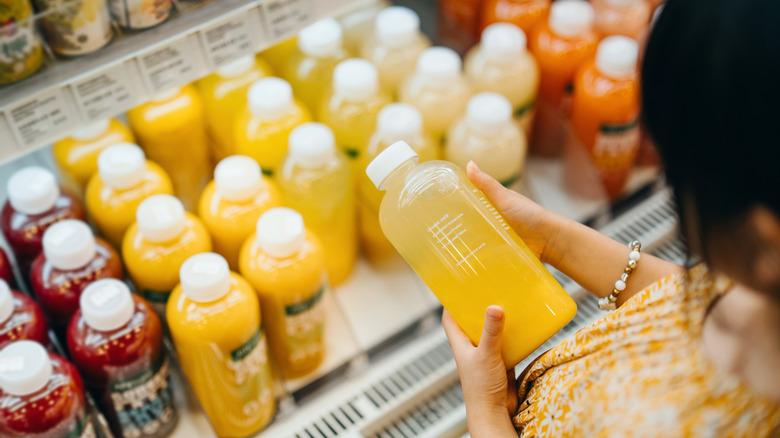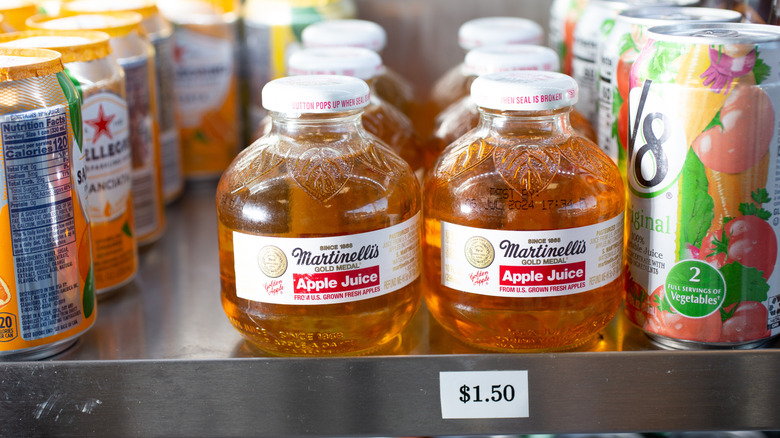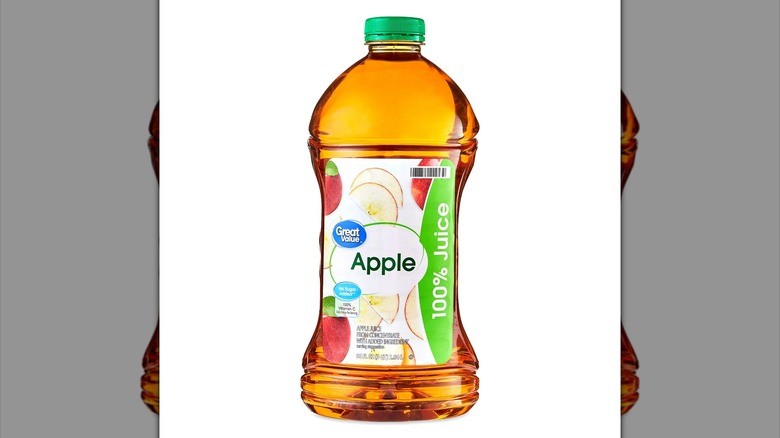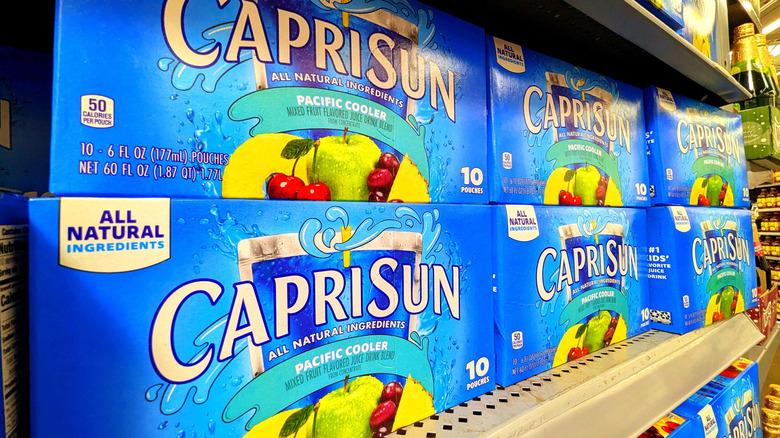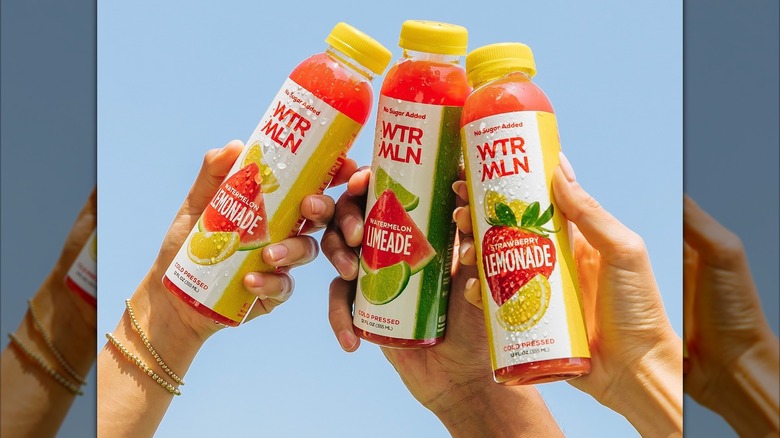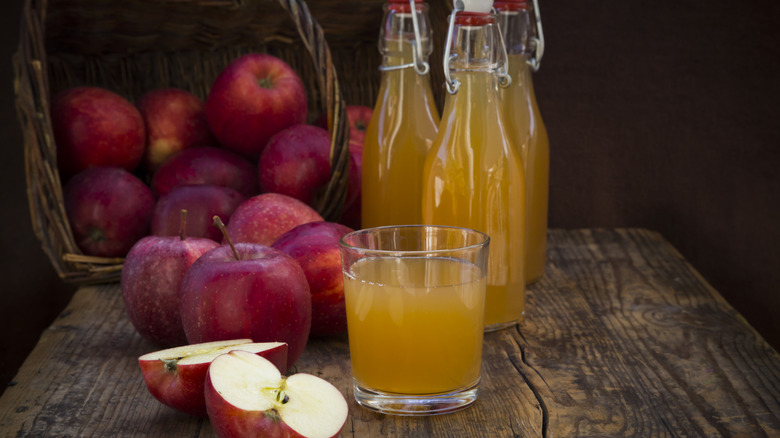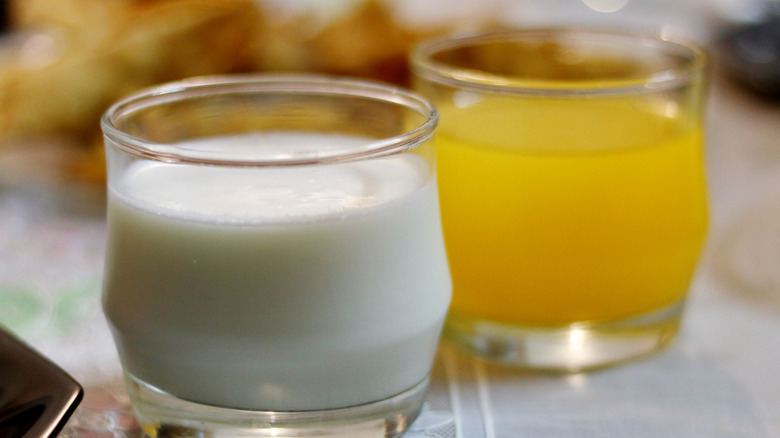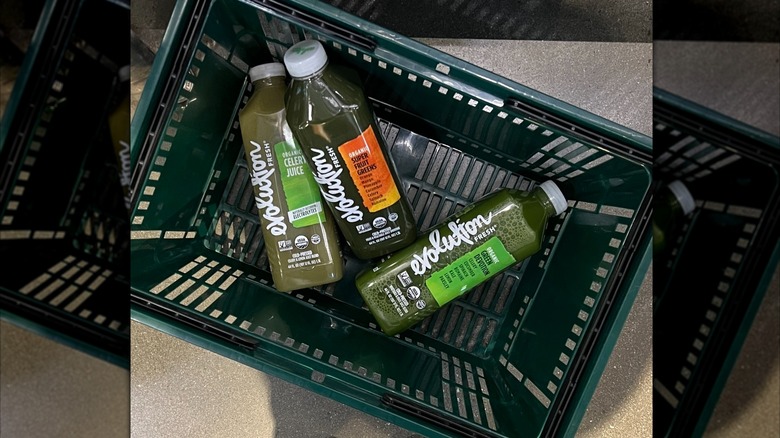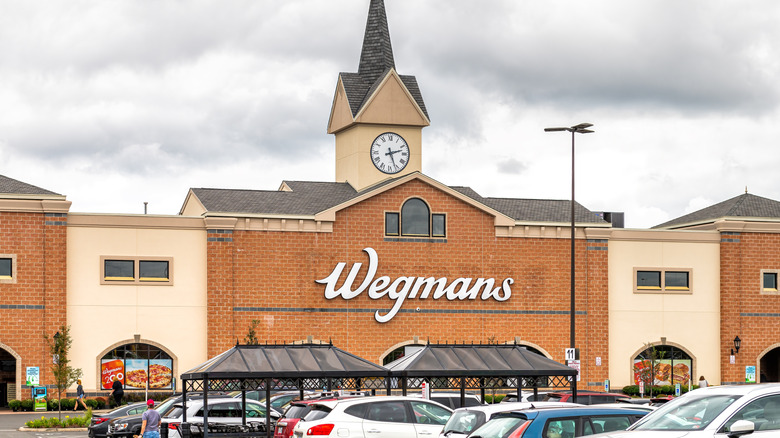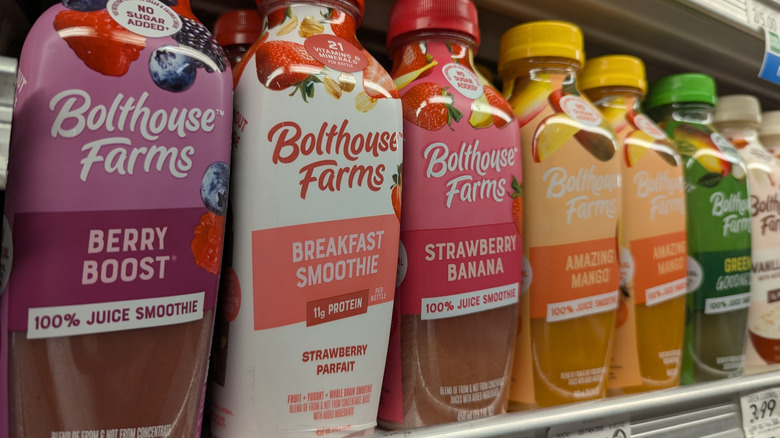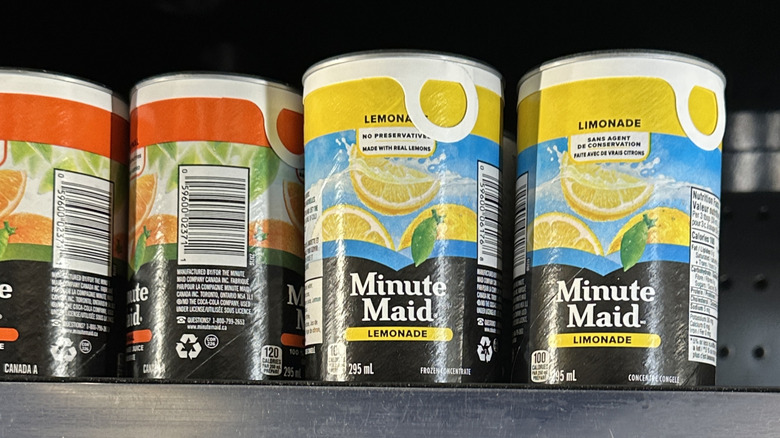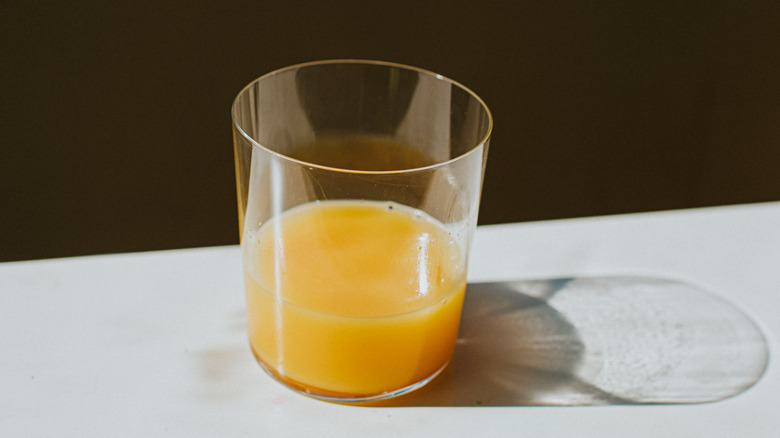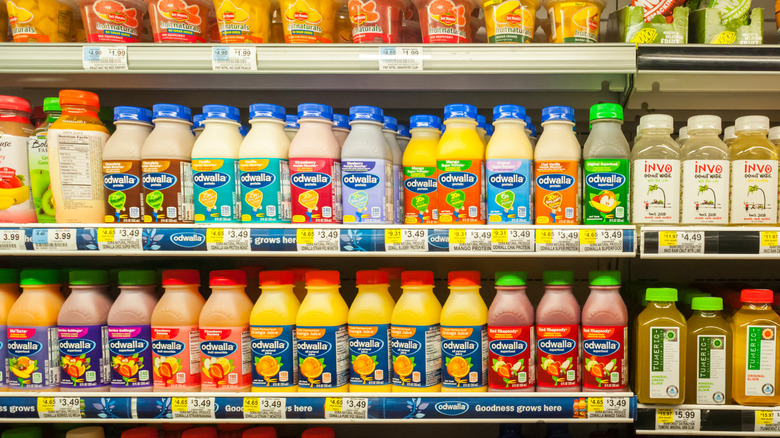13 Juice Recalls That Impacted Millions
We may receive a commission on purchases made from links.
If you've been keeping an eye on the news and thinking that food recalls are on the rise, you're not imagining things. Major recalls seem to be hitting headlines on a near-daily basis and some are even deadly, as was the case with the deadliest food recall of 2025 thus far, wherein supplement shakes killed 14 and hospitalized 41 unlucky individuals.
Some foods are recalled more often than others, with the foods most likely to be recalled including raw meats, deli meats, and produce – but what about juice? If you think that the only potentially dangerous thing lurking in that carton or bottle of juice in your fridge is the high fructose corn syrup or Red Dye 40, think again. You might just want to check your glass twice before you take that next sip.
Juice is recalled on the regular, and for some truly frightening reasons, from the discovery of bits of metal and plastic floating around in household name-brand fruit juices to cleaning products being found in pouches of Capri Sun. Here are some of the most extensive juice recalls, impacting millions over the last three decades.
Martinelli's recalls apple juice due to patulin (2025)
In the spring of 2025, Martinelli's, a historic juice and cider brand based in California, issued a recall for its apple juice. The recall impacted more than 170,000 bottles of apple juice that had been distributed across more than half of the United States. The reason? Elevated levels of patulin.
If you're not familiar with patulin, it's a naturally occurring mycotoxin (which is just a fancy word for a fungus-produced toxin). Mycotoxins are found in all sorts of foods, from various fruits like apples to nuts and spices. While recognizing that patulin is a risk and that it can't be killed via pasteurization, the US Food and Drug Administration (FDA) does allow for a small portion of patulin in apple juice products.
While the levels of patulin in Martinelli's were found to be "elevated" (per NBC News), it wasn't reported whether or not those levels exceeded the legal limit. Even if that wasn't the case, though, patulin is more likely to occur in elevated levels when apple juice is made from spoiled fruit – and do you really want to drink juice made from a moldy apple?
Great Value apple juice recall linked to arsenic (2024)
It's not just patulin that might appear in your apple juice. In 2024, Refresco Beverages recalled more than 100,000 cases of apple juice that had been sold at Walmart under the Great Value brand, as well as at other major chains under their own brands, including Weis, Walgreens, and Aldi.
The juice was recalled as it contained arsenic above the legal levels. (Yes, just as is the case with patulin, the FDA does allow for a certain amount of arsenic in your food.) Arsenic can enter the food supply in both organic and inorganic forms, from the soil or via environmental pollution. If you eat just a little arsenic, you might experience gastrointestinal distress, heart rhythm abnormalities, or pins and needles in your hands and feet. However, long-term exposure can cause cancer and eating enough will, of course, kill you. The government considers a "high level" of arsenic to be 60 parts-per-million.
Capri Sun recalls contaminated juice pouches (2022)
For many millennials, Capri Sun is the flavor of summer. Unfortunately, in 2022, that flavor was more than a little off. That year, parent company Kraft Heinz issued a recall for 5,760 cases of its wild cherry-flavored Capri Suns. The company said that a diluted cleaning product that was typically used on its processing equipment, had potentially made its way into the actual juice drink blend. The scariest bit? The recall wasn't actually issued until customers began complaining that the Capri Suns tasted weird. At that point, the potential accident was uncovered. Luckily, there were no reports of anyone coming to any harm after drinking the contaminated juices.
We all want our foods processed and manufactured in clean spaces, but cleaning products really need to be kept far away from the actual food. This is hardly the first time in recent history that a cleaning product-related recall has been issued. In March 2025, for example, Cargill Kitchen Solutions recalled more than 200,000 pounds of liquid egg products (Egg Beaters), after discovering they might contain a cleaning solution made with sodium hypochlorite, aka bleach.
Watermelon juice recalled due to plastic (2019)
In 2019, World Waters, which makes WTRMLN WTR, recalled its cold-pressed watermelon juices that were, at the time, being sold at major chains across the country, including at Walmart, Winn-Dixie, and Publix. The company said that some consumers could possibly find small bits of soft plastic floating around in their juice, which could prove a choking hazard (and plus, it's just not something you want to eat).
Plastic contamination is one of the most common reasons food is recalled, as is metal contamination. Used both in packaging and in the manufacturing and production processes, the two substances often break apart and wind up in everything from frozen pizzas to cans of soda. While it's estimated that the average human eats about 5 grams of plastic per week, via consuming microplastics, which is about the amount of plastic in a credit card, you certainly don't want to eat more of it — so if you find a piece of plastic in your food, do yourself (and other unassuming consumers) a favor and report it to the brand.
High Hill Ranch recalls hospitalization-inducing apple juice (2015)
It's not just food recalls in general that are up. Hospitalizations related to food recalls have also increased. A U.S. PIRG Education Fund analysis found that, in 2024, the number of food recall-related illnesses increased, year over year, while the number of hospitalizations and deaths actually doubled. Luckily, no one died during a High Hill Ranch apple juice recall in 2015, but one individual was hospitalized.
The ranch had sold some raw apple juice that sickened more than a dozen people, with the juice testing positive for E. coli. The ranch issued a statement at the time that suggested that perhaps the presence of E. coli was due to ranch visitors with dirty hands touching their free sampling station, rather than anything the ranch had done incorrectly in its food production and handling processes. The ranch did, though, stop selling its unpasteurized apple juice. E. coli, a bacteria that lives in animals' lower intestines, can only be killed by cooking foods to 158 degrees Fahrenheit or hotter.
Lehigh Valley Dairy recalls milk-contaminated OJ (2014)
You might enjoy a glass of milk with breakfast, as well as a glass of orange juice, but no one's mixing these two breakfast beverages together, in one cup. However, that was basically the reason for a 2014 recall, when regional chain Lehigh Valley Dairy reported that some of its orange juice may have contained milk, too. The orange juice had been distributed across Pennsylvania, New Jersey, Delaware, Maryland, Virginia, and West Virginia, as well as under the Price Chopper grocery store brand. The milk ended up in the OJ due to a manufacturing error.
While this may not seem like a big deal to some — just throw it out if you pop open your OJ to find a milky surprise — for others, milk contamination is a serious worry. Milk allergies, which are more common in children, can cause symptoms ranging from the uncomfortable (hives, itching, coughing, vomiting) to the deadly (anaphylaxis). As such, the FDA treats items with undeclared milk in them (whether that inclusion is purposeful or a mistake, as was the case here) very seriously.
Evolution Fresh swelling juice bottles recalled (2014)
It's a general good rule of thumb that, if your food's packaging is swelling, throw it out. Bulging and swelling are some of the main hints that a can of food, for example, may contain the toxin that could cause botulism, a toxin that's life-threatening to the point that it's considered a potential terror weapon. As such, it was probably a good idea, in 2014, when Evolution Fresh recalled nearly 2,000 bottles of its organic sweet greens and ginger juice, because the bottles were mysteriously swelling. The juice had been sold in California and Nevada, in various grocery stores.
At the time, Starbucks owned Evolution Fresh and this was far from the only recall to plague the chain over the years. Starbucks recalls have affected millions over the chain's lifetime and, in 2014, the chain was also dealing with a Bodum coffee press recall, due to the presses breaking while in use, causing multiple injuries. Starbucks sold Evolution Fresh to juice brand Bolthouse Farms (which has had its own recall worries) in 2022.
Wegmans recalls organic juices due to mold (2013)
Regional grocery chain Wegmans recalled two of its organic fruit juices — its Food You Feel Good About Organic Apple Juice and Food You Feel Good About Organic Cranberry Juice Blend — due to an issue not uncommon in the apple juice industry. Like Martinelli's would later discover in 2025, Wegmans found mold byproduct patulin in its juice.
If you see an apple that's turned brown and rotted, or that shows off some blue mold, there's a chance it contains a dangerous level of patulin. However, these visible markers aren't always present, which is how the sneaky, patulin-bearing bad apple can make its way into a juice press. From there, while the fruit juice production process can overall lower the amount of patulin in the final product, it might not lower that amount to the degree that the juice will be considered safe by federal standards. If you do eat patulin, studies suggest that you might experience gastrointestinal stress at best; at worst, the substance is a carcinogen.
PepsiCo recalls orange juice due to contaminated water (2012)
In 2012, PepsiCo recalled nearly 300 multipacks of Tropicana Kids orange juice, as it was reported that the drinks contained contaminated water. What exactly the water was contaminated by is up for debate, though, as initial reports simply mentioned a microbiological contamination, which is a broad term that could be linked to anything from viruses and bacteria to fungi and protozoa. The packaging only include the contaminated water, no orange juice at all.
Tropicana has faced numerous recalls over the years. In 2002, Tropicana recalled 100,000 jugs of orange juice that had been offered at Sam's Club stores across the country, after it was discovered the orange juice had been contaminated with a cleaning solution. In this instance, a consumer was harmed, needing medical care to treat a burning sensation in their mouth and stomach following drinking the liquid. Other consumers sniffed the OJ before sipping, and returned the drink to stores with complaints.
It's all bad news for Tropicana, which has seen financial woes in recent history. This includes decreases in income and revenue that can be tracked to lessened market demand and declining orange harvests, necessitating a $30 million emergency loan.
Bolthouse Farms recalls carrot juice over botulism fears (2006)
In 2006, three individuals went to a hospital complaining of vision problems and muscle weakness. Just a few days later, all three patients were on ventilators and, following an investigation into what they had all eaten, it was found that they had all shared a bottle of Bolthouse Farms carrot juice. Later in the month, another patient who'd consumed the carrot juice was also hospitalized, paralyzed, and put on a ventilator.
Bolthouse Farms, of course, issued a recall for the product, which had been distributed across the country and in Canada. At the time of the recall, it was suggested that perhaps the four people who had fallen seriously ill had not properly refrigerated the carrot juice. Improper refrigeration can indeed cause the toxins that result in botulism to build up and, in fact, one study found that 37 cases of botulism, including four botulism-linked deaths, occurred in the United States between 1994 and 2021, all trackable to inadequate refrigeration, whether in the consumers' homes or in the stores before purchase. Still, to be on the safe side, a recall was issued.
Minute Maid recalls plastic-filled juice bars (2000)
It's not just your liquid juice you have to worry about. In 2000, Minute Maid recalled its frozen juice bars, a decision that impacted 300,000 boxes of the product, due to the bars containing food-grade plastic. The non-toxic plastic particles were large enough that they were deemed a choking hazard. As for the "food grade" bit, no, that doesn't mean that the plastic is necessarily any safer to eat. Instead, food-grade plastics are BPA-free and tested to ensure they won't leach out toxic chemicals when they're in contact with your food — think a plastic cup or bowl.
Just as recalls have made Tropicana's life a little harder, even though this particular recall occurred more than 25 years ago, it was still a blow for Minute Maid. At the time, the company was struggling to increase its earnings — though optimistic that the recall wouldn't cause any long-term problems. A decade later, that hope seemed to have panned out, with the Coca-Cola-owned Minute Maid boasting a higher value than Pepsi-owned Tropicana.
The brand's still not free of all recalls, though. In 2024, it had to recall more than 13,000 cases of Minute Made Zero Sugar Lemonade due to a mislabeling error (the product inside each can was lemonade, but not zero-sugar lemonade). In 2021, the brand recalled fruit punch products due to the worry that some of the packaging could contain some missing metal bolts and washers.
Sun Orchard recalls OJ that sickened 200-plus (1999)
In June 1999, the Centers for Disease Control (CDC) confirmed that it had identified or was investigating nearly 300 cases of salmonella-linked food poisoning that had occurred over the United States and Canada. Throughout the salmonella outbreak, a significant number of the patients treated reported drinking Sun Orchard unpasteurized orange juice. As a result, the brand recalled its juices. Eventually, the CDC tracked the origin source of the salmonella to a Mexican juice producer that had supplied Sun Orchard with some of its product, prompting the federal government to begin testing juice at the Mexican border.
However, this would only be the first juice recall for the brand in 1999. Later, in November, Sun Orchard recalled another nearly 4,000 gallons of salmonella-contaminated orange juice, which had this time been distributed throughout Arizona, California, Colorado, New Mexico, Oregon, Texas, Utah, and Washington, to primarily food service establishments (meaning any impacted consumers would have likely drank the orange juice at a restaurant).
Odwalla recalls apple juice nationwide, kills one (1996)
Very rarely do food recalls make headlines to such a degree that they get their own Wikipedia pages, but this recall can boast one, tragically. In 1996, an E. coli outbreak impacted consumers across Canada and the Western United States, after they drank Odwalla's unpasteurized apple juice and products containing that apple juice. By the end of the outbreak, nearly 70 individuals had fallen ill and a 16-month-old child had died. Others developed life-threatening conditions.
As a result, the company not only recalled all of its apple juice products, but it ended up pleading guilty to criminal charges, making waves as the first criminal conviction of its type and the largest criminal fine in a case of this type to date, with Odwalla on the hook for $1.5 million. The company also paid the victims' medical bills and newly began flash-pasteurizing all its apple juice, after admitting that it did not know E. coli could be found in unpasteurized juice. Not only, though, does unpasteurized juice harbor E. coli, but it also can contain hepatitis A, salmonella, and cryptosporidium.
